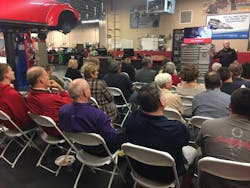What if there was a proven, low-cost tool available to bring new customers in the door of your tire dealership? In addition to more traffic, it promises online benefits, too, as customers typically respond by posting positive online reviews. And since an estimated 5% of independent tire dealers are doing it, it’s likely you can claim the advantage before the competitor across town figures it out.
That “it” boils down to three little words: car care clinic.
“It’s not this overwhelming, complicated thing that’s going to take a lot of time and special expertise,” says John Arnold, consumer tire education content development manager for Bridgestone Americas Tire Operations LLC. “It’s actually fairly simple and fairly limited in scope. A dealer is very likely doing each of these things you would cover in a car care clinic every day.”
Arnold has spent decades in the industry helping tire dealers with their businesses. For 30 years, he worked for tiremakers as a salesman in the field. Since 2012, he’s managed educational programs for Bridgestone dealers.
Those programs include the company’s car care academy, a how-to guide to help tire retailers host their own car care clinics. It’s a structure to help dealers cover the basic topics, stay on track and keep the event focused on customers. The information is available to any authorized Bridgestone dealer, says Arnold.
“It takes the mystery out of holding the event,” Arnold says of the playbook. “They can see the start, the finish, how far you go on each topic and what topics are covered. It makes it easy for a dealer to participate in this, and it becomes an even more valuable resource to the dealer’s customer base.”
How to prepare
The biggest task is inviting people to attend, though Arnold says dealers typically find success when they reach out to groups like the Girl Scouts and Boy Scouts, or other civic groups or community organizations. Women’s groups are historically receptive to invitations, he says.
Here’s a tip: After distributing invitations, send a reminder. Doctors, dentists and hair stylists all remind their clients of upcoming appointments, and tire dealers should do the same, says Arnold. A simple email reminder with the time, date and location of the clinic helps keep the event top of mind.Clinics help take the mystery out of automotive maintenance for consumers. “The purpose of the car care academy is to reassure them while there are some important steps to take to get the most out of their vehicle and driving experience, they’re fairly easy and simple.”
Beyond the invitations and reminders, hosting an event requires the basic clean-up work for any event a store might hold. “Make the dealership look nice,” says Arnold. That means taking out the trash, tidying up the space and making sure windows are clean, he adds. After that, you need a vehicle and a lift so you can show both the vehicle’s undercarriage and its engine.
“The steps are very quick and easy, and best of all, almost cost-free. This is a very low-cost proposition for a dealership.”
What to cover
Arnold says an effective car care clinic is a summary of conversations tire dealers have with consumers every single day. “The good news is it’s not terribly difficult.”
He recommends that dealers start with the following points of discussion:
Tire maintenance: Even with tire pressure monitoring systems (TPMS), consumers need to know to continue to check the air pressure in their tires. Arnold recommends telling customers that the TPMS light doesn’t come on until 10 pounds of pressure is lost, and that even 5 pounds of underinflation can drastically affect tread wear, over time. Show them where to find the correct air pressure for their tires and vehicle and talk about how tread wear even can indicate the presence of a mechanical problem.
“They’re simple things, but they’re very important,” Arnold says.
Fluids: Dealers should leverage their own experience and give an overview of the fluids in a vehicle, from coolant and oil to brake and transmission fluids, he says. Can they be checked? How often should they be checked? When should they be changed? Explain why these fluids are important to a vehicle’s overall health, he advises.
Other maintenance: This can include everything from windshield wipers and brakes to batteries and alignments. Explain what’s involved in an alignment, and what customers are paying for, says Arnold. “These are common things that dealers are doing every day, but they’re doing it on a random basis. Draw them together in a nice, neat package.
“It’s a happier conversation than explaining why a customer needs to spend $200 on a battery on the car that just got towed in, or why that misalignment condition just ruined the front tires they paid so much money for only nine months earlier,” Arnold says. “It takes some of the stress out of these conversations. And you’re helping them avoid a future problem.”
The benefits
Bridgestone hasn’t collected data uniformly from the car care clinics it helps dealers offer, “but anecdotal reports from dealers are they do get a lift from these events, sales-wise.” On average, 20% of participants return within three weeks for some kind of service, Arnold adds.
And typically, they are new customers.
He says there’s some evidence to suggest even more people return within the six-month window, but that’s been harder for dealers to pin down.
There’s another benefit for dealers. Those who have hosted clinics often see a boost in online reviews.
“The reviews tend to be more strongly positive for dealers who have reached out to the community, particularly if they reach out to the parents of younger people, like Girl Scouts,” Arnold says. “Parents are very protective of their children and they really take an interest in dealers who take an interest in educating their kids on keeping their vehicle safe.”
GB Auto Service is a believer
Count Jeffry Gardner, director of marketing for GB Auto Service Inc., as a car care clinic believer. He leads the marketing and community engagement efforts for the 116 stores and seven brands that make up the GB Auto Service portfolio.
Gardner worked for Brakemax Tire & Service Centers before it was acquired by the private equity company, and he says Brakemax regularly hosted events.
“We had staged several of them to better communicate with the community, to discuss maintenance and help people understand maintenance in a non-sales way,” says Gardner. “Customers can be on the defensive when in a store. This way you can interact without that added stressor.”
He’s working to make car care clinics a staple at all GB Auto Service locations, but admits it’s been slow going as he so far has led the sessions, and thus must take travel into consideration.
He’s based in Tucson, Ariz., but the company also has stores in California, Nevada and Texas. He’s led anywhere from six to nine clinics a year — most of them in Arizona, except for one at a Tire Works Total Car Care store in Henderson, Nev.
In each one, he and the store’s team members cover the basics to help drivers “have a better understanding of the mechanics” of their vehicle.
In Tucson, Phoenix and Las Vegas, they talk about the impact of the region’s dry air and low humidity on a vehicle’s tires and rubber hoses.
Sometimes they hold the sessions in the bays. Other times, they’re held in the showroom. It’s always an after-business-hours affair with catered food. Since the stores are often in or near a shopping center, they’ll partner with other nearby businesses and give attendees goody bags and prizes.
Gardner says the largest clinic had three dozen attendees, “and that was probably too much because people are less likely to ask questions. It starts to feel like a college course.
“Twenty to 30 people is probably the sweet spot. I’ve done them with as few as 10 people. It’s a different dynamic.”
So how does he gauge an event’s success? “Direct conversion of an attendee to a customer isn’t something we’ve pushed for,” he says. “When I’m leaving a clinic and I see customers surrounding the manager and asking different questions, or setting up appointments, I think, ‘I created that relationship and helped build that rapport.’ There’s no key performance indicator to say this is how much business was brought in, but that’s not the point. It’s more long-term.”
Gardner says the stores give attendees VIP discount cards and follow up with emails after sessions. “But we’re careful not to solicit business, because customers are savvy. They don’t want to be sold on anything. We present the information, let them know that we’re here, and hope they can put it all together.” ■
Car Care Clinics: Why Women are so Receptive
“It’s my personal belief that they have a more receptive audience with women,” he says. “Women are more open to saying, ‘I don’t know much about this subject and I would like to learn more.’
“I think it’s like the ‘men don’t cry’ thing. Men certainly do cry, but they try to hide it. When it comes to vehicle knowledge or lack thereof, I think some are reluctant to admit they don’t know some basic things like how often should the coolant be changed in a car, or when they should have a car aligned. ‘When should I check the brakes?’ They feel that, as males, they should have been born with this knowledge, and to admit they don’t know may be uncomfortable.”
About the Author
Joy Kopcha
Managing Editor
Joy Kopcha joined Modern Tire Dealer and Auto Service Professional as senior editor in 2014 after working as a newspaper reporter for a dozen years in Kansas, Indiana and Pennsylvania. She was named managing editor of MTD and ASP in 2022, and took on that same role with Motor Age in 2024.
She is an award-winning journalist, including in 2023 when she was named a Jesse H. Neal Awards Finalist.
Don't miss any of her articles. Sign up for MTD's newsletters.

